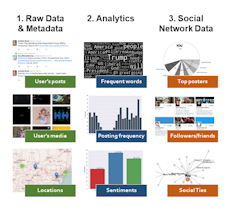As businesses around the world slowly start to reopen after being forced to shut down operations due to the COVID-19 pandemic, the graduates of the class of 2020 are sharpening their presentation skills and updating their resumes to look for employment opportunities. But will their polished resumes make them more competitive relative to their peers?
The answer may surprise you. In today’s digitally mediated world, well-prepared resumes may not be enough to make you stand out among hundreds of candidates.
Due to the increasing use of social media around the globe (especially now during #socialdistancing), many recruiters and hiring managers find social media attractive as a readily available source of real-time data to find and vet candidates.
Social media is used by potential employers to check job applicants’ qualifications, assess their professionalism and trustworthiness, reveal negative attributes, determine whether they post any problematic content and even assess “fit.”
(Shutterstock)
Screening applicants
We examined social media users’ attitudes towards employers using social media to screen job applicants, a process known as cybervetting. We conducted an online survey of 454 participants, primarily from the United States and India, with a followup study surveying 482 young adults in Canada.

(Gruzd, Jacobson, Dubois)
In these studies, we compared people’s comfort level with cybervetting in relation to different types of information that could be gathered from publicly accessible social media platforms. These were readily available information in the form of raw data and metadata, meaning what they had posted, when and how; analytics information that would require processing, for example, results of sentiment analysis or topic modelling of an applicants’ posts; and information related to users’ online social network that is often used for social network analysis, for example who follows whom on social media.
Expectations of privacy
The results revealed the nuanced nature of social media users’ privacy expectations in the context of hiring practices. Individuals have context-specific and data-specific privacy expectations. People who are already concerned about social media platforms collecting their personal information and possibly sharing it without their consent are less comfortable with third parties using social media data to screen job applicants — even if it’s publicly available.
On the other hand, individuals who are more comfortable with this practice are also more concerned that social media platforms might be storing inaccurate information about them. This may be a sign of “digital resignation,” a phenomenon in which people are worried about privacy but recognize that companies still engage in this practice. Social media users may want to ensure that information collected about them from online sources is accurate, since erroneous representations may negatively impact their success on the job market.
Read more:
How blockchain could prevent future data breaches
Comfort levels
We also found that being a job-seeker does not necessarily make one more or less comfortable with cybervetting. And there is no significant relationship between one’s gender and the comfort level with this practice. Regardless of one’s employment status or gender, our findings point to the presence of expectations and concerns with social media screening.
Our results highlight the need for employers and recruiters who rely on social media to screen job applicants to be aware of the types of information that may be perceived to be more sensitive by applicants, such as social network-related information (like friends’ lists and connections among friends).
Our research stresses the importance of employers aligning their hiring practices with people’s expectations. If job applicants are aware of and not comfortable with cybervetting, companies may lose the opportunity to recruit high-quality applicants.
Alternatively, employees may lose trust in the company if they later learn about the company’s social media screening practices. Despite the lack of regulations about cybervetting in most countries, employers should proactively state if they engage in cybervetting, outline what social media will be examined and describe how the information will be used.
Ethical hiring practices matter, and this type of transparency is a first step towards giving the next generation of graduates and employees a fair chance of landing their dream job.
Credit: Source link




